Choosing Aluminium Framed Sliding Doors for Your Home
Table of Contents
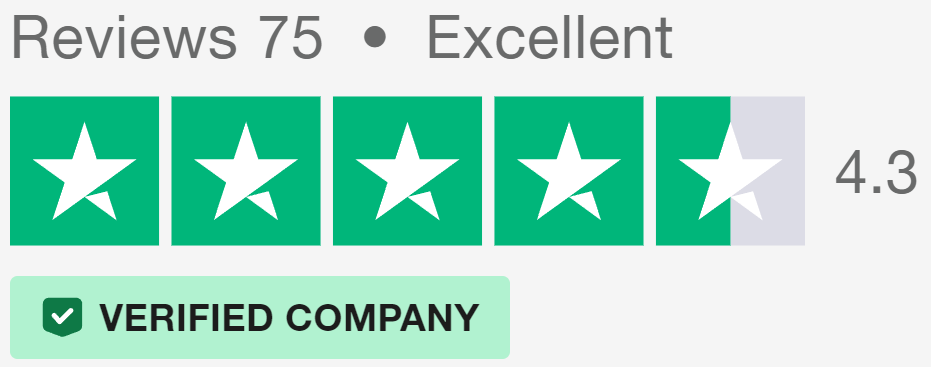
What Aluminium Framed Sliding Doors Can Do
Modern aluminium framed sliding doors offer far more than simply connecting two spaces. Glass panels spanning from floor to ceiling bring streams of natural light into darker rooms, while robust frames provide the strength needed for larger openings. Precision-engineered running gear allows panels weighing up to around 200kg to glide smoothly along their tracks, making them practical for daily use despite their impressive size.
Space-Saving
Slim frames allow aluminium frame sliding doors to slide smoothly along discrete tracks, rather than swinging into your living space like traditional doors. Where a hinged door might need several square metres of clearance, slide doors tuck neatly behind fixed panels. This design proves particularly useful in smaller properties or areas where space comes at a premium. Multi-track systems let you position the doors exactly where you want them, opening up just a small section for ventilation or pushing all panels to one side for unrestricted access to your garden.
Operating mechanisms built into the frame’s header section keep the floor track minimal. Well-designed drainage channels built into the bottom track prevent water pooling during heavy rain, while brush seals stop leaves and debris from affecting the running gear’s operation. Stainless steel wheels carry the weight of the glass smoothly and quietly, with adjustment mechanisms letting you fine-tune the door’s movement over time.
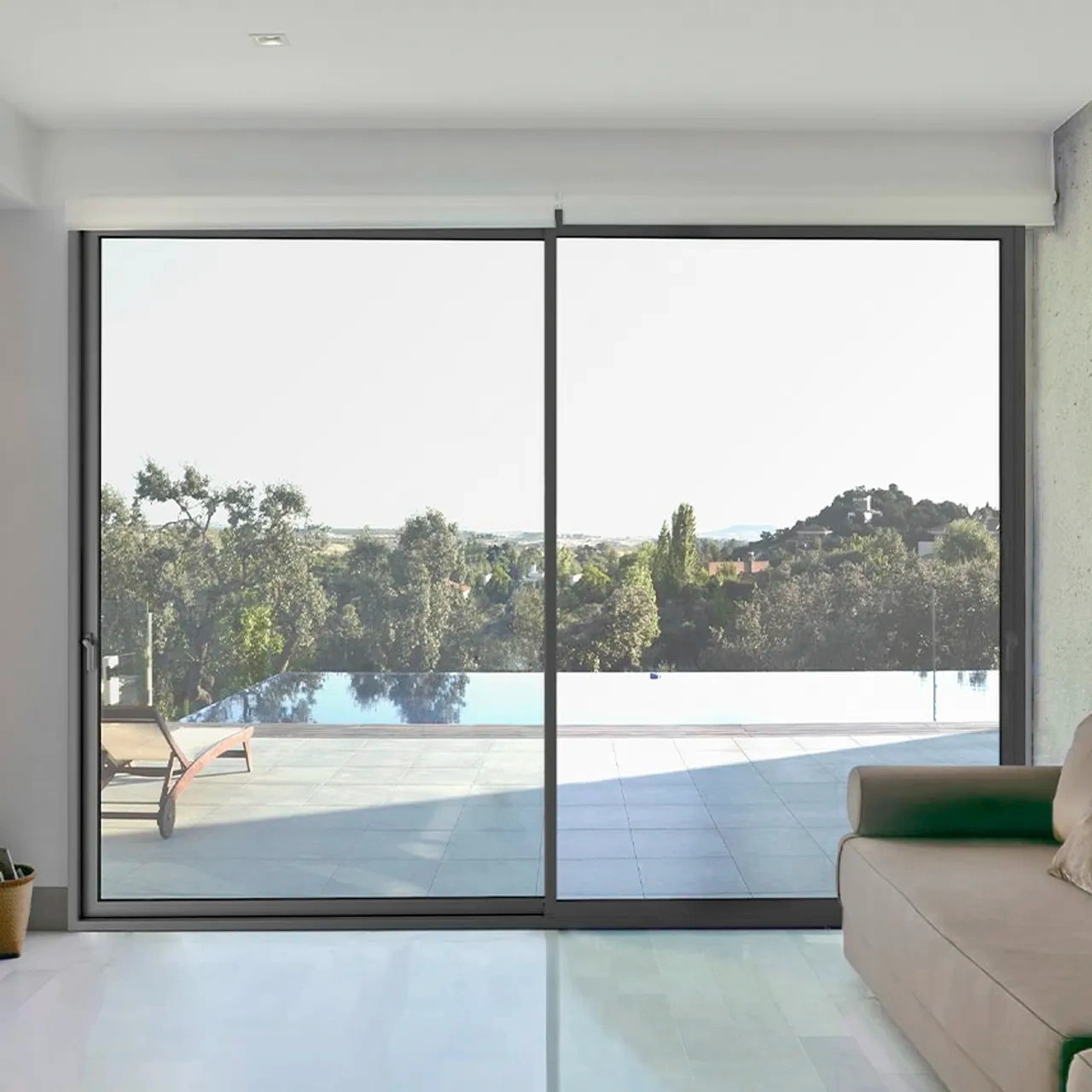
Energy Performance
The thermal performance of today’s aluminium framed sliding doors stands leagues ahead of older systems. Multi-chambered frames and advanced thermal break technology help prevent heat from escaping during winter months. Well-engineered aluminium doors also create reliable barriers against drafts and rainfall, maintaining comfortable indoor temperatures year-round. Modern glass coating technology reduces heat loss while allowing plenty of warming winter sun to penetrate your rooms.
Double-glazed units filled with argon gas provide excellent insulation, while optional triple glazing offers even better performance for north-facing installations. High-quality weather seals around each panel keep out drafts and driving rain. The robust construction of aluminium framed sliding doors means they maintain their weather-tight seal year after year, unlike some materials that can warp or shrink with age.
Heat Management Systems
Modern thermal break systems incorporate polyamide strips between the inner and outer sections of aluminium framed sliding doors. This prevents cold from travelling through the metal frame while maintaining the strength needed to support large glass panels. The result? Lower heating bills and warmer rooms during chilly British winters. Advanced gasket systems create multiple barriers against heat loss, while maintaining smooth operation in all weather conditions.
Low-emissivity glass coatings work alongside thermal breaks to reduce heat transfer through the glazing itself. These microscopic metal oxide layers reflect heat back into your room during winter while helping to keep spaces cooler in summer. Different coating options let you balance thermal performance with light transmission, ensuring your rooms stay bright and comfortable throughout the year.
Today’s Design Choices
Manufacturers now produce aluminium framed sliding doors with frames as slim as possible without compromising structural integrity. Bold anthracite grey frames make striking statements in contemporary homes, while subtler metallic finishes blend beautifully with period properties. Powder-coated aluminium withstands decades of British weather without fading or corroding, keeping its fresh appearance far longer than traditional timber frames.
Often available in hundreds of RAL colours, aluminium framed sliding doors can match any design scheme. Dual-colour options allow different finishes inside and out, letting you coordinate with both your interior décor and external building materials. Textured powder coatings add subtle depth to the frame’s appearance while providing extra durability in coastal locations. Different handle styles and security hardware options let you personalise the doors’ appearance while maintaining high security standards.
Frame Design Guide for Aluminium Sliding Doors
Choosing the right frame style affects how your space looks and feels. Aluminium framed sliding doors come in various profiles, each suited to different architectural styles and practical needs. Contemporary systems push engineering limits to create incredibly narrow sightlines without sacrificing strength or security.
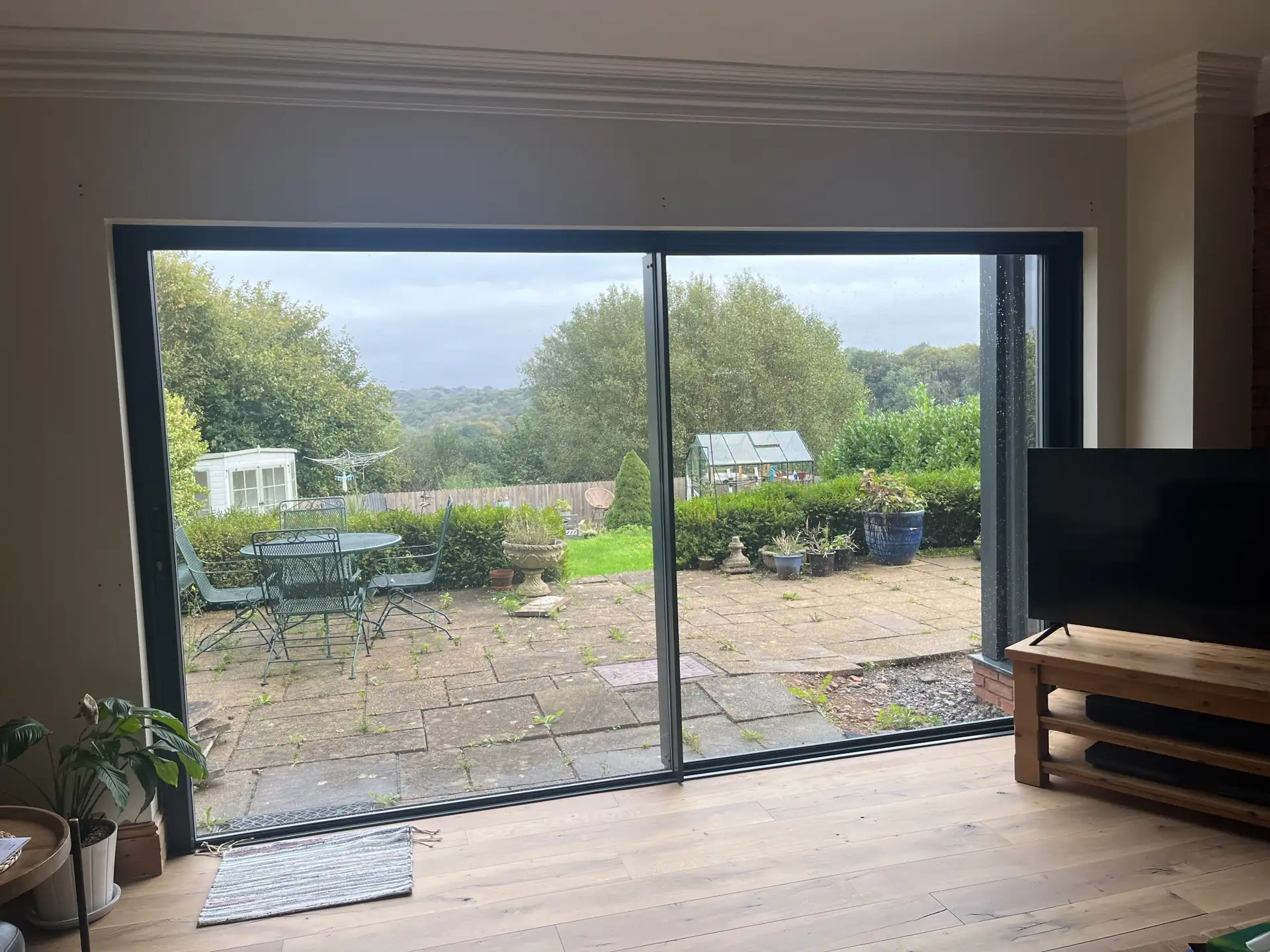
Slim Frame Options
Modern aluminium framed sliding doors feature outer frame profiles that measure as little as around 70mm wide, letting you fit larger glass expanses into smaller openings. Advanced aluminium alloys maintain structural integrity even with minimal frame widths, supporting taller and wider glass panels than ever before. These slimline patio doors work particularly well in modern extensions, where clean lines complement contemporary architecture.
Glass patio doors with ultra-slim frames need careful engineering to handle their weight. Each panel can weigh up to 200kg, requiring precision-made rollers and sturdy rail systems. Yet despite their robust construction, new manufacturing techniques allow frames to remain remarkably narrow.
Quality external doors must balance appearance with performance. While some aluminium framed sliding doors emphasise minimal sight lines, others incorporate more substantial frames to accommodate advanced locking systems or automated operation. The frame depth also varies depending on the chosen glass unit thickness and required thermal performance.
Threshold Choices
Low thresholds create smooth paths between interior floors and outdoor space. Modern aluminium frame sliding doors can incorporate flush thresholds that sit almost level with your flooring, ideal for family homes or properties needing wheelchair access. Deeper threshold profiles offer improved weather protection, making them better suited to exposed locations.
Well-designed drainage channels prevent water accumulation without creating trip hazards. Specially shaped tracks guide rainwater away from the building while allowing panels to slide smoothly. Multiple brush seals stop drafts without impeding movement, maintaining comfort whatever the weather.
Integrated Drainage Systems
Hidden drainage slots and carefully engineered water management channels protect your home from British weather. These systems direct water away from vulnerable areas while remaining almost invisible. Deeper thresholds include additional barriers against wind-driven rain, particularly important for tall sliding doors in exposed locations.
Corner Systems
Corner configurations eliminate visual barriers between inside and out. By removing the corner post, aluminium framed sliding doors can create panoramic views that stretch around building corners. These sophisticated systems require precise installation but offer impressive results.
Structural calculations determine the maximum size of corner openings, balancing the desire for uninterrupted views with the building’s structural needs. Load-bearing requirements often influence frame specifications, though modern engineering allows for remarkably wide openings without compromising safety.
Supporting large glass panels at corners demands robust engineering. Special corner carriers distribute weight evenly while allowing smooth operation. Interlocking mechanisms ensure security when closed, creating reliable barriers against the elements. Multiple panels can stack neatly away from the corner, creating expansive openings during warmer months.
Glass Selection and Thermal Performance
Modern aluminium framed sliding doors incorporate advanced glazing technology that improves both comfort and energy efficiency. Precise engineering creates tight seals between frame and glass, while sophisticated glass coatings control heat transfer throughout the year.
Double vs Triple Glazing
The best sliding glass doors balance thermal performance with practical factors like weight and cost. Double glazed aluminium framed sliding doors typically feature two panes of toughened safety glass separated by a gas-filled cavity. This construction provides excellent energy efficient performance while keeping the overall unit weight manageable. Triple glazing adds a third pane, creating two insulating spaces that reduce heat loss even further.
Gas-filled cavities between panes act as invisible insulating barriers. Argon gas, denser than air, limits heat transfer between inside and out. Advanced spacer bars around the edge of each unit prevent gas from escaping while reducing condensation risk around the glass edge.
Sound insulation improves substantially with multiple glass panes. Standard double glazed aluminium framed sliding doors reduce outside noise noticeably, while triple glazing offers even better acoustic performance. Different glass thicknesses in the same unit can reduce specific sound frequencies, particularly useful near busy roads.
Solar Control
South-facing aluminium frame sliding doors benefit from specialised glass coatings that manage solar gain. Microscopic metal oxide layers on the glass surface reflect excess heat while maintaining good light transmission. This technology helps prevent overheating in summer without making rooms feel dark or gloomy.
Different coating combinations suit various scenarios. North-facing doors might prioritise heat retention, while west-facing installations often need stronger solar control to prevent afternoon overheating. Some patio door systems include glass that changes its performance with the seasons, allowing more heat through during winter months.
Advanced Glazing Options
Modern manufacturing allows for increasingly sophisticated glass units. Self-cleaning coatings use sunlight to break down dirt, reducing maintenance needs. Laminated glass provides extra security and UV protection, while integral blinds sealed within the glazing unit offer privacy without cleaning hassles.
Meeting Building Standards
Current building regulations set strict standards for thermal performance. Aluminium framed sliding doors must achieve specific U-values that measure heat loss through the entire door system. The base frame design, glazing specification, and thermal break technology all contribute to meeting these requirements.
Testing under standardised conditions proves energy performance claims. Independent certification gives reliable figures for heat loss, helping you compare different systems fairly. Quality manufacturers provide detailed technical data about their aluminium framed patio doors, including thermal calculations for various frame and glass combinations.
Modern thermal break technology creates effective barriers within aluminium profiles. Multiple polyamide strips stop heat travelling through metal sections while maintaining structural strength. This engineering allows aluminium doors to match or exceed the thermal performance of other frame materials.
Water-tightness testing ensures reliability in British weather. Test rigs subject sample doors to wind-driven rain at increasing pressures, checking both frame design and seal effectiveness. Air-tightness testing reveals how well the overall system prevents drafts, another important factor in real-world energy performance.
Common Uses for Aluminium Framed Sliding Doors
Aluminium framed sliding doors prove valuable in many home layouts. Large glass panels add brightness while taking up minimal space, making them ideal for modern living patterns where adaptability matters.
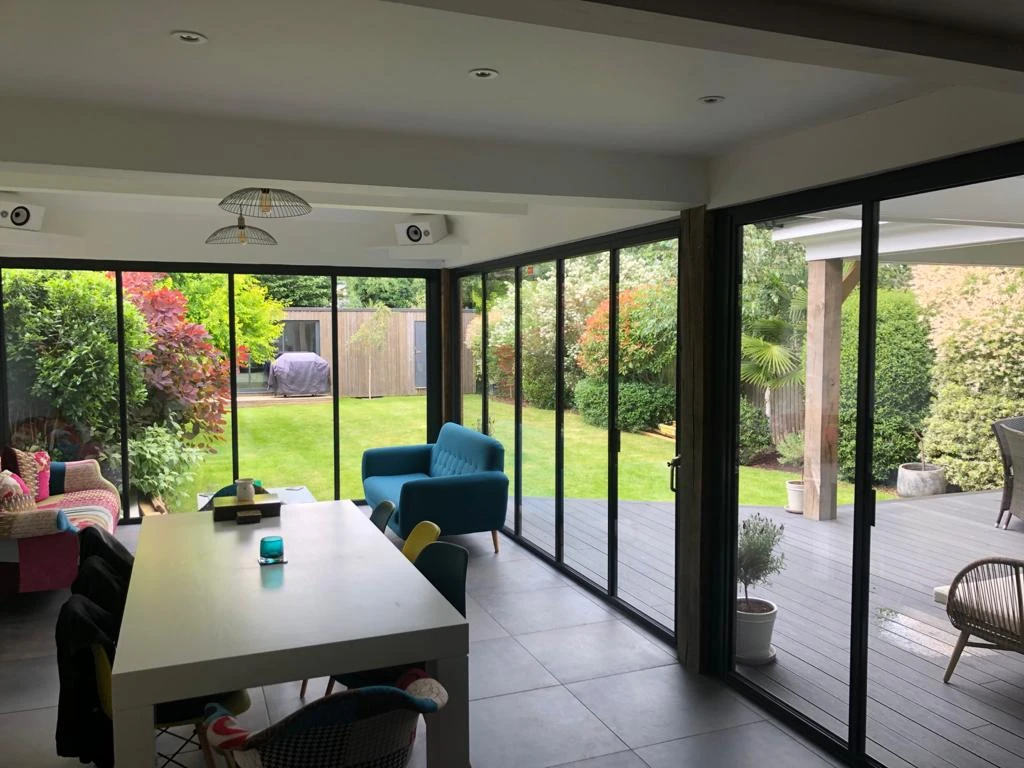
Kitchen Extensions
Modern aluminium framed sliding doors fit perfectly in kitchen extensions, allowing full views of the garden while cooking or entertaining. Wide openings let cooking aromas escape quickly, while well-insulated frames and glass maintain comfortable temperatures year-round. Flush thresholds create easy access to outdoor dining areas, particularly useful when carrying plates or moving furniture.
Wider kitchen-diners benefit from multi-panel aluminium patio doors that open from the centre, letting you adjust the opening size to suit different occasions. Robust locks in the frame and meeting stiles provide security without cluttering clean sight lines.
Conservatory Updates
Replacing older conservatory doors with aluminium framed sliding doors often improves both appearance and usability. Modern thermal breaks and high-performance glass help regulate temperature extremes that plague many older conservatories. Slim frames allow more light through than traditional PVCu systems, making spaces usable throughout the year.
Well-designed aluminium frame sliding doors include reliable drainage channels that protect against water ingress – a common issue in older conservatories. Multi-point locking systems built into the frames provide better security than many original conservatory doors.
Dining Rooms
Sliding dining room doors create adaptable entertainment spaces that work in all seasons. Aluminium framed sliding patio doors spanning full walls bring natural daylight to dining tables while maintaining excellent insulation. Opening options range from small gaps for ventilation to full-width access for summer parties.
Corner configurations remove visual barriers between dining areas and gardens entirely. This arrangement proves especially effective in open-plan spaces where different zones flow naturally into each other. Advanced thermal engineering keeps dining areas comfortable regardless of external temperatures.
Garden Rooms
Garden room sliding doors need robust construction to withstand frequent use and variable weather. Modern aluminium profiles resist twisting and warping while supporting large glass panels that give uninterrupted garden views. Multi-track systems allow different opening configurations to suit changing weather conditions.
Advanced thermal breaks in the frames help maintain stable temperatures – essential for garden rooms used as home offices or gyms. Low-threshold options create smooth connections with decking or patio areas, while still providing protection against wind-driven rain.
Room Dividers
Internal aluminium framed sliding doors serve as effective room dividers without permanent barriers. Clear glass maintains visual connections between spaces while providing acoustic separation when needed. Double-track systems allow panels to stack against walls, creating completely open spaces for larger gatherings.
The strength of aluminium frames supports taller panels than many alternative materials, letting you match ceiling heights exactly. Sound-reducing glass options help create quiet zones within busy homes, particularly useful for properties combining living and working spaces.
Styling Aluminium Framed Sliding Doors
Modern aluminium framed sliding doors offer numerous design possibilities. From minimal frames that nearly disappear to bold architectural statements, each style choice shapes how your space looks and feels.
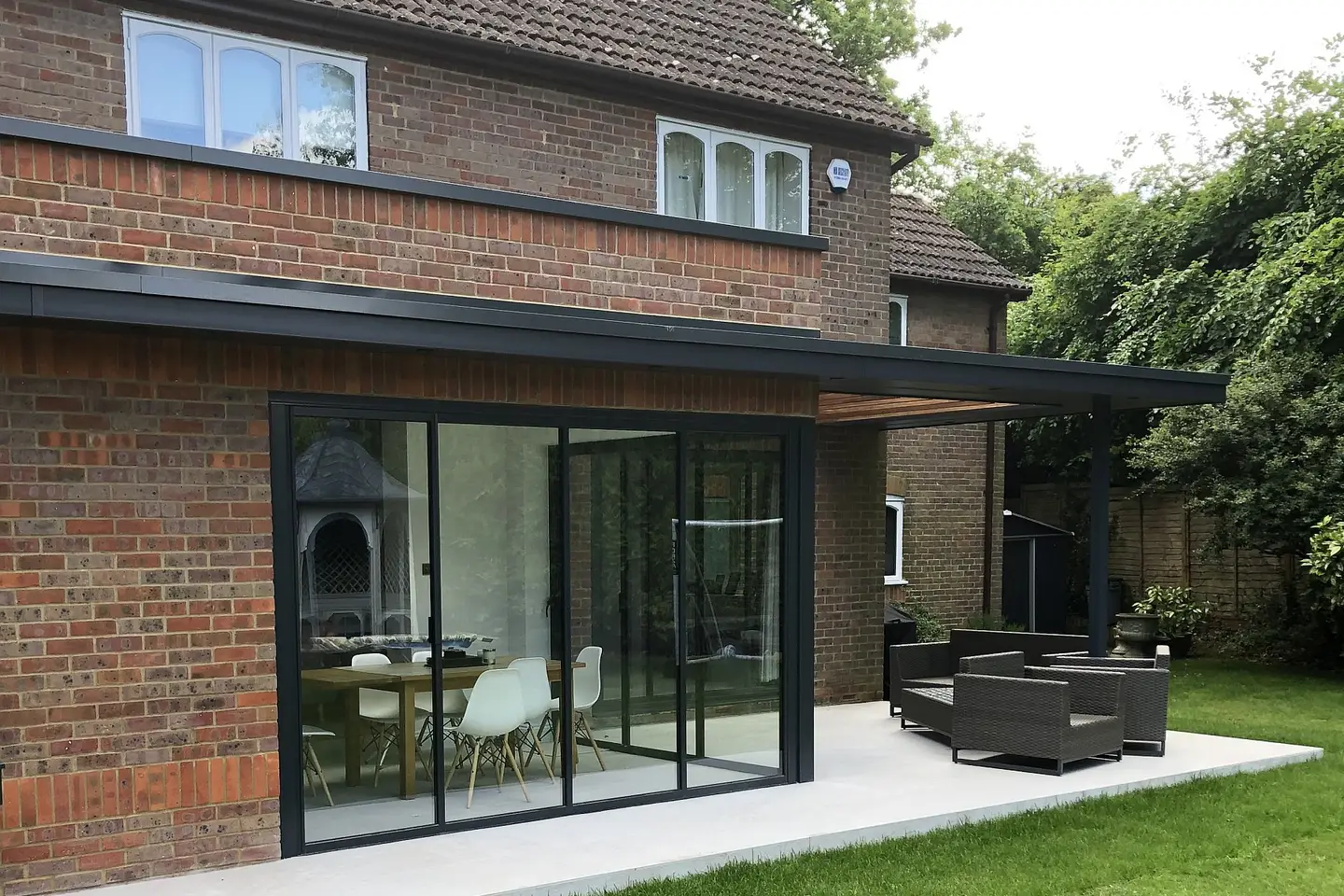
Frame Colours
Powder-coated finishes create durable, attractive surfaces that last for decades. Popular anthracite grey sliding doors work well with both traditional and contemporary architecture, offering a sophisticated alternative to standard white frames. Metallic finishes catch light differently throughout the day, adding subtle interest to your aluminium frame sliding doors without overwhelming other design elements.
Textured coatings provide extra depth while hiding minor marks and scratches. Dual-colour options let you match external brickwork while coordinating internal frames with your wall colours. Marine-grade finishes resist fading and corrosion in coastal areas, maintaining their appearance despite harsh conditions.
Glass Types
Self-cleaning glass reduces maintenance needs while keeping views crystal clear. Low-iron options remove the slight green tint found in standard glass, making aluminium framed sliding doors appear almost invisible when closed. Privacy glass creates screening in overlooked areas without blocking natural light.
Special coatings on modern glass manage heat and light transmission. Different coating combinations suit various aspects and room uses – south-facing rooms might benefit from solar control glass, while north-facing installations often prioritise thermal retention. Some slide doors include glass that adapts to changing light levels, providing natural shading on bright days.
Advanced Glazing Features
Laminated glass adds security while filtering harmful UV rays that can fade furniture and flooring. Sound-control glass helps create quieter spaces, particularly useful in urban locations or near busy roads. Different glass thicknesses within the same unit can target specific noise frequencies, improving acoustic comfort.
Window Dressing
Side-mounted blinds maintain clean lines while providing privacy when needed. Slim venetian blinds integrated within the glazing units never need dusting, operating smoothly via magnetic controls. Shaped pelmets conceal blind mechanisms without adding bulk to aluminium framed sliding doors.
Remote-controlled shading systems offer convenient light management. Powered blinds can link to home automation systems, adjusting automatically with changing light levels or temperature. Manual options provide reliable operation without depending on electronics, ideal for simpler installations.
Material Coordination
Natural stone thresholds complement aluminium frames while providing durability in high-traffic areas. Matching aluminium skirting boards create coherent design details that tie spaces together. Floor finishes that run through from inside to out make spaces feel larger, with careful detailing around door thresholds maintaining smooth surfaces.
Special frame inserts allow you to match interior architraves with other joinery. Corner details where frames meet walls need careful planning to maintain clean lines. Different gasket colours let you match or contrast with frame finishes, adding subtle design elements to aluminium framed sliding doors.
Design Details
Flush frame joints create clean corners without visible fixings. Handle designs range from minimal finger pulls to architectural statement pieces, each adding their own character to the doors. Concealed hardware maintains pure lines while allowing easy operation, with mechanisms hidden within frame profiles.
Technical Installation of Aluminium Framed Sliding Doors
Proper installation determines how well aluminium framed sliding doors perform over time. Precise measurements, careful preparation, and attention to detail create systems that work reliably for decades.
Ground Preparation
Level bases provide essential foundations for smooth operation. Structural calculations determine exact loading requirements, while laser levelling ensures perfect alignment of support structures. Steel reinforcement within concrete bases helps distribute weight evenly, preventing settlement that could impair door operation.
Aluminium frame patio doors need careful integration with surrounding walls. Appropriate fixings secure frames firmly while allowing for thermal movement – particularly important with large glass areas. Insulation packed between frames and walls prevents heat loss through gaps, improving overall thermal performance.
Hidden drainage channels protect threshold areas from water damage. Proper falls direct rainwater away from door openings, while compressed foam seals prevent wind-driven rain from penetrating gaps. Sub-sill systems provide extra protection in exposed locations, managing water that might bypass primary seals.
Weather Protection
British weather demands robust protection systems. Brush seals along panel edges stop drafts without creating friction, while compression gaskets form tight seals when doors close. Multiple barrier designs prevent water reaching vulnerable areas, with each line of defence backing up others.
Thermal breaks within aluminium frame sliding doors prevent condensation forming on internal surfaces. Warm-edge spacer bars around glazing units reduce cold spots where condensation might form. Careful detailing around thresholds stops cold bridging that could cause problems in winter months.
Maintenance Requirements
Well-installed aluminium framed sliding doors need minimal upkeep. Annual checks of running gear catch minor issues before they develop. Simple cleaning keeps tracks free from debris that might affect smooth operation, while silicon spray lubricant helps maintain easy movement.
Regular adjustment of rollers compensates for building movement. Lock mechanisms benefit from light lubrication yearly, preventing stiffness developing over time. Gaskets and seals last many years but should be checked periodically for signs of wear or damage.
We’d Love to Help You
Vision Glass Doors is a designer, manufacturer, and installer of premium door systems. We are a family run business with over 20 years’ experience and 5,000 installations across the UK.
Our leading range of door systems include Ultra Slim – Slide and Turn Doors, Slimline Sliding Patio Doors and Frameless Glass Doors. Suitable for various internal and external applications, they are applicable to residential and commercial projects.
Click Quick Quote Online for a free quotation within 24 hours. Alternatively, call or email us on 01582 492730 or at info@visionglassdoors.co.uk.

